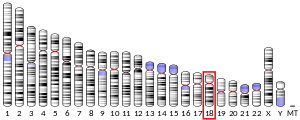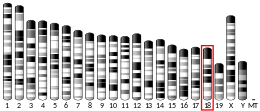SETBP1
| SETBP1 | |||||||||||||||||||||||||||||||||||||||||||||||||||
|---|---|---|---|---|---|---|---|---|---|---|---|---|---|---|---|---|---|---|---|---|---|---|---|---|---|---|---|---|---|---|---|---|---|---|---|---|---|---|---|---|---|---|---|---|---|---|---|---|---|---|---|
| Identifiers | |||||||||||||||||||||||||||||||||||||||||||||||||||
| Aliases | SETBP1, SET binding protein 1, SEB, MRD29, SET bindign protein 1 | ||||||||||||||||||||||||||||||||||||||||||||||||||
| External IDs | OMIM: 611060; MGI: 1933199; HomoloGene: 9192; GeneCards: SETBP1; OMA:SETBP1 - orthologs | ||||||||||||||||||||||||||||||||||||||||||||||||||
| |||||||||||||||||||||||||||||||||||||||||||||||||||
| |||||||||||||||||||||||||||||||||||||||||||||||||||
| |||||||||||||||||||||||||||||||||||||||||||||||||||
| |||||||||||||||||||||||||||||||||||||||||||||||||||
| |||||||||||||||||||||||||||||||||||||||||||||||||||
| Wikidata | |||||||||||||||||||||||||||||||||||||||||||||||||||
| |||||||||||||||||||||||||||||||||||||||||||||||||||
SET binding protein 1 is a protein that in humans is encoded by the SETBP1 gene.[5]
Gene
The gene is located on Chromosome 18, specifically on the long (q) arm of the chromosome at position 12.3. This is also written as 18q12.3.
Function
The SETBP1 gene provides instructions for making a protein known as the SET binding protein 1, which is widely distributed throughout somatic cells. The protein is known to bind to another protein called SET. SETBP1 is a DNA-binding protein that forms part of a group of proteins that act together on histone methylation to make chromatin more accessible and regulate gene expression.[6] There is still more to learn about the overall function of the SETBP1 protein and the effect of SET binding.
Clinical significance
Gain-of-function mutations in the SETBP1 gene are associated with Schinzel–Giedion syndrome.[7]
Loss-of-function mutations in the SETBP1 gene are associated with a SETBP1-related developmental delay called SETBP1 disorder which causes a spectrum of symptoms including absent speech/expressive language delays, mild-severe intellectual disability, autistic-traits/autism, developmental delays, ADHD, and seizures.[8] [9]
SETBP1 is a oncogene; specific somatic mutations of this gene were discovered in patients affected by atypical Chronic Myeloid Leukemia (aCML) and related diseases. These mutations, which are identical to the ones present in SGS as germ line mutations, impair the degradation of SETBP1 and therefore cause increased cellular levels of the protein.[10]
References
- ^ a b c GRCh38: Ensembl release 89: ENSG00000152217 – Ensembl, May 2017
- ^ a b c GRCm38: Ensembl release 89: ENSMUSG00000024548 – Ensembl, May 2017
- ^ "Human PubMed Reference:". National Center for Biotechnology Information, U.S. National Library of Medicine.
- ^ "Mouse PubMed Reference:". National Center for Biotechnology Information, U.S. National Library of Medicine.
- ^ "Entrez Gene: SET binding protein 1".
- ^ Piazza R, Magistroni1 V, Redaelli S, Mauri M, Massimino L, Sessa A, Peronaci M, Lalowski M, Soliymani R, Mezzatesta C, Pirola A,Banfi F, Rubio A, Rea D, Stagno F, Usala E, Martino B, Campiotti L, Merli M, Passamonti F, Onida F, Morotti A, Pavesi F, Bregni M, Broccoli V, Baumann M, Gambacorti-Passerini C. (June 2018) "SETBP1 induces transcription of a network of development genes by acting as an epigenetic hub." Nature Communications. 6 (9): 2192. doi:10.1038/s41467-018-04462-8 PMC 5989213 PMID 29875417
- ^ Acuna-Hidalgo R, Deriziotis P, Steehouwer M, Gilissen C, Graham SA, van Dam S, Hoover-Fong J, Telegrafi AB, Destree A, Smigiel R, Lambie LA, Kayserili H, Altunoglu U, Lapi E, Uzielli ML, Aracena M, Nur BG, Mihci E, Moreira LM, Ferreira VB, Horovitz DD, da Rocha KM, Jezela-Stanek A, Brooks AS, Reutter H, Cohen JS, Fatemi A, Smitka M, Grebe TA, Di Donato N, Deshpande C, Vandersteen A, Lourenço CM, Dufke A, Rossier E, Andre G, Baumer A, Spencer C, McGaughran J, Franke L, Veltman JA, De Vries BB, Schinzel A, Fisher SE, Hoischen A, van Bon BW (Mar 2017). "Overlapping SETBP1 gain-of-function mutations in Schinzel-Giedion syndrome and hematologic malignancies". PLoS Genetics. 13 (3). doi:10.1371/journal.pgen.1006683.
{{cite journal}}: CS1 maint: unflagged free DOI (link) - ^ Filges I, Shimojima K, Okamoto N, Röthlisberger B, Weber P, Huber AR, Nishizawa T, Datta AN, Miny P, Yamamoto T (Feb 2011). "Reduced expression by SETBP1 haploinsufficiency causes developmental and expressive language delay indicating a phenotype distinct from Schinzel-Giedion syndrome". Journal of Medical Genetics. 48 (2): 117–22. doi:10.1136/jmg.2010.084582. PMID 21037274.
- ^ Coe BP, Witherspoon K, Rosenfeld JA, van Bon BW, Vulto-van Silfhout AT, Bosco P, Friend KL, Baker C, Buono S, Vissers LE, Schuurs-Hoeijmakers JH, Hoischen A, Pfundt R, Krumm N, Carvill GL, Li D, Amaral D, Brown N, Lockhart PJ, Scheffer IE, Alberti A, Shaw M, Pettinato R, Tervo R, de Leeuw N, Reijnders MR, Torchia BS, Peeters H, Thompson E, O'Roak BJ, Fichera M, Hehir-Kwa JY, Shendure J, Mefford HC, Haan E, Gécz J, de Vries BB, Romano C, Eichler EE (October 2014). "Refining analyses of copy number variation identifies specific genes associated with developmental delay". Nature Genetics. 46 (10): 1063–71. doi:10.1038/ng.3092. PMC 4177294. PMID 25217958.
- ^ Piazza R, Valletta S, Winkelmann N, Redaelli S, Spinelli R, Pirola A, Antolini L, Mologni L, Donadoni C, Papaemmanuil E, Schnittger S, Kim DW, Boultwood J, Rossi F, Gaipa G, De Martini GP, di Celle PF, Jang HG, Fantin V, Bignell GR, Magistroni V, Haferlach T, Pogliani EM, Campbell PJ, Chase AJ, Tapper WJ, Cross NC, Gambacorti-Passerini C (Jan 2013). "Recurrent SETBP1 mutations in atypical chronic myeloid leukemia". Nature Genetics. 45 (1): 18–24. doi:10.1038/ng.2495. PMC 3588142. PMID 23222956.
Further reading
- Minakuchi M, Kakazu N, Gorrin-Rivas MJ, Abe T, Copeland TD, Ueda K, Adachi Y (Mar 2001). "Identification and characterization of SEB, a novel protein that binds to the acute undifferentiated leukemia-associated protein SET". European Journal of Biochemistry / FEBS. 268 (5): 1340–51. doi:10.1046/j.1432-1327.2001.02000.x. PMID 11231286.
- Suphapeetiporn K, Srichomthong C, Shotelersuk V (Apr 2011). "SETBP1 mutations in two Thai patients with Schinzel-Giedion syndrome". Clinical Genetics. 79 (4): 391–3. doi:10.1111/j.1399-0004.2010.01552.x. PMID 21371013.
- Ott MG, Schmidt M, Schwarzwaelder K, Stein S, Siler U, Koehl U, Glimm H, Kühlcke K, Schilz A, Kunkel H, Naundorf S, Brinkmann A, Deichmann A, Fischer M, Ball C, Pilz I, Dunbar C, Du Y, Jenkins NA, Copeland NG, Lüthi U, Hassan M, Thrasher AJ, Hoelzer D, von Kalle C, Seger R, Grez M (Apr 2006). "Correction of X-linked chronic granulomatous disease by gene therapy, augmented by insertional activation of MDS1-EVI1, PRDM16 or SETBP1". Nature Medicine. 12 (4): 401–9. doi:10.1038/nm1393. PMID 16582916.
- Filges I, Shimojima K, Okamoto N, Röthlisberger B, Weber P, Huber AR, Nishizawa T, Datta AN, Miny P, Yamamoto T (Feb 2011). "Reduced expression by SETBP1 haploinsufficiency causes developmental and expressive language delay indicating a phenotype distinct from Schinzel-Giedion syndrome". Journal of Medical Genetics. 48 (2): 117–22. doi:10.1136/jmg.2010.084582. PMID 21037274.
- Marseglia G, Scordo MR, Pescucci C, Nannetti G, Biagini E, Scandurra V, Gerundino F, Magi A, Benelli M, Torricelli F (Mar 2012). "372 kb microdeletion in 18q12.3 causing SETBP1 haploinsufficiency associated with mild mental retardation and expressive speech impairment". European Journal of Medical Genetics. 55 (3): 216–21. doi:10.1016/j.ejmg.2012.01.005. PMID 22333924.
- Li R, Brockschmidt FF, Kiefer AK, Stefansson H, Nyholt DR, Song K, Vermeulen SH, Kanoni S, Glass D, Medland SE, Dimitriou M, Waterworth D, Tung JY, Geller F, Heilmann S, Hillmer AM, Bataille V, Eigelshoven S, Hanneken S, Moebus S, Herold C, den Heijer M, Montgomery GW, Deloukas P, Eriksson N, Heath AC, Becker T, Sulem P, Mangino M, Vollenweider P, Spector TD, Dedoussis G, Martin NG, Kiemeney LA, Mooser V, Stefansson K, Hinds DA, Nöthen MM, Richards JB (May 2012). "Six novel susceptibility Loci for early-onset androgenetic alopecia and their unexpected association with common diseases". PLoS Genetics. 8 (5): e1002746. doi:10.1371/journal.pgen.1002746. PMC 3364959. PMID 22693459.
{{cite journal}}: CS1 maint: unflagged free DOI (link) - Ishikawa K, Nagase T, Nakajima D, Seki N, Ohira M, Miyajima N, Tanaka A, Kotani H, Nomura N, Ohara O (Oct 1997). "Prediction of the coding sequences of unidentified human genes. VIII. 78 new cDNA clones from brain which code for large proteins in vitro". DNA Research. 4 (5): 307–13. doi:10.1093/dnares/4.5.307. PMID 9455477.
- Piazza R, Valletta S, Winkelmann N, Redaelli S, Spinelli R, Pirola A, Antolini L, Mologni L, Donadoni C, Papaemmanuil E, Schnittger S, Kim DW, Boultwood J, Rossi F, Gaipa G, De Martini GP, di Celle PF, Jang HG, Fantin V, Bignell GR, Magistroni V, Haferlach T, Pogliani EM, Campbell PJ, Chase AJ, Tapper WJ, Cross NC, Gambacorti-Passerini C (Jan 2013). "Recurrent SETBP1 mutations in atypical chronic myeloid leukemia". Nature Genetics. 45 (1): 18–24. doi:10.1038/ng.2495. PMC 3588142. PMID 23222956.
- Ganesan AK, Kho Y, Kim SC, Chen Y, Zhao Y, White MA (Jun 2007). "Broad spectrum identification of SUMO substrates in melanoma cells". Proteomics. 7 (13): 2216–21. doi:10.1002/pmic.200600971. PMID 17549794.
External links
This article incorporates text from the United States National Library of Medicine, which is in the public domain.




